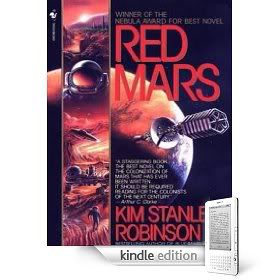Red Mars
Nominally a future-history of Martian colonization, Red Mars covers the initial 100 Martian colonists, the influx of workers as corporations attempt to exploit the planet's resources, and the consequences as conditions worsen. The book is divided into eight parts, each telling the story from the point of view of one of six characters. Each character is interesting and three dimensional. The first, Frank Chalmers, is a stunning example - a machiavellian sociopath who arranges the murder of his best friend. The book suggests early on that the characters are dysfunctional, but most are not, and Robinson describes each personality in a way that's easy to relate to. Most readers will see some of themselves in every character, and will be moved when many disappear from the story as events unfurl.Robinson's prose is easy to read and descriptive. He lovingly describes the Martian landscape, and the events that change the planet. He explains the processes and technologies being used to make the planet more habitable. Mars and its future is viewed through different cultures and ideologies. And Robinson describes political and social systems evolving, growing, and collapsing - the only challenges the colonists seem unable to solve are those that cannot be fixed technologically. The ending is dramatic and, cheesy last line notwithstanding, overwhelming.A word about the politics: Several reviewers have trouble understanding the concept of sympathetic characters not representing the author. Nobody argues that, through Chalmers, Robinson is advocating murder, so why assume that characters portrayed as idealistic hot-heads advocating an enlightened Utopia (not communism) are attempts to convert readers to Marxism? Robinson's prediction of a near future where a handful of democratically unaccountable transnational corporations wield more power than governments is neither unreasonable nor extremist propaganda nor unique; nor is it that people sick of these conditions might reject them for something Utopian, and might make up a sizable proportion of those wanting to leave Earth. Robinson is describing what might happen and why, rather than pushing a particular ideology. It is notable that the consequences of the actions of most of the first 100 are hardly positive: why would an author promote a vision of an enlightened Utopia by having for it such divided, belligerent, builders?
If Red Mars has faults, they are that it is fairly humourless, and some of the science (nothing, fortunately, important to the principle of convincing the reader that colonization is possible) is somewhat stretched.
There are no ray-guns or bug-eyed aliens: there is much to think about. If you're looking for an airport novel, go read L. Ron Hubbard. If you can watch CNN talking 23 hours a day about scandals effecting minor Democrats, and still grumble "Darned liberal bias", you may be too right-wing to cope with fictional characters disagreeing with you; go read some "Doc" Smith or something instead. Otherwise the reader needs patience and a willingness to get inside a whole range of radically different characters. Most of the book is interesting, but the climax is especially so.
Posing more problems than answers, Red Mars leaves the reader uneasy about humanity's progress, with a mix of optimism about what we can do, and pessimism for what we are likely to do; it portrays characters the reader can feel for, and a planet to fall in love with. What a wonderful book.
Labels: best-seller, new books, Red Mars, science


